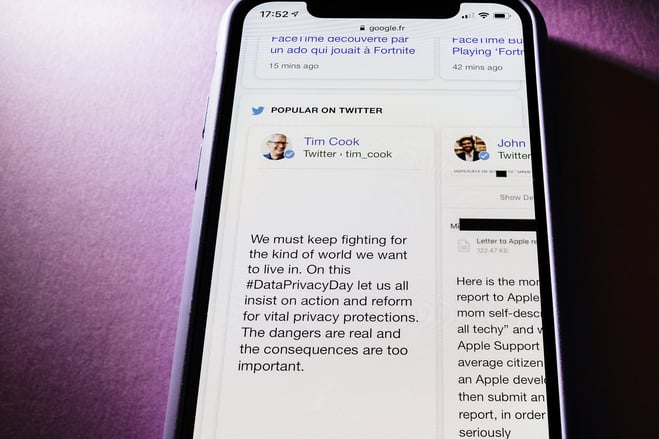Share this
Government Eavesdropping and Onsite Backdoors
by Reflare Research Team on May 4, 2021 5:27:00 PM
In the name of ‘national security’, there continues to be repeated calls for tech organisations to build backdoors into their systems to enable government access. The overarching concern is that corporations use of backdoors will undermine and weaken encryption methods, and there are already efforts to break into web-based encryption protocols, with businesses and regular people being the target.
First Published 16th December 2015 | Latest Refresh 4th May 2021

Big brother plays nosey neighbour.
4 min read | Reflare Research Team
Drivers of Behaviour
In the mid-2010s, terrorist attacks in France and the US led to several debates regarding cryptography, privacy, and government eavesdropping and backdoors. Post-Snowden, it was unlikely that any laws allowing government eavesdropping would pass. However, other ominous efforts to encroach on public privacy were (and still are) a concern, especially cryptographic backdoors within popular social media such as Facebook.
Context
For anyone who doesn’t understand the significance of onsite backdoor access from the government, consider that anything you post whether threatening or just innocuous banter would be read by government officials freely and without any court order. New laws surrounding cryptographic backdoors give government agencies access to even secure communication, which makes any efforts to block eavesdropping useless.
Social media aren’t the only companies fighting government access. Apple famously replied to a court order stating that it could not unlock iPhones running iOS 8 or higher. This came after the government demanded the company unlock an iPhone seized during a drug case.
It's the Law?
Even more concerning is the push toward banning encryption altogether. The push is backed by government officials who claim that allowing encrypted communication allows criminals and terrorists to communicate securely. These officials claim that they should be able to retrieve decrypted messages and photos. Consider you are making a banking transaction with encrypted communication. The government would be able to read this information regardless of security.
New laws were proposed after it was announced that terrorists used encrypted communication to avoid government detection. Unfortunately, the concept of catching terrorists using these techniques is flawed, because terrorists can add a layer of their own protection knowing that they are under surveillance.

Easier to say when you have a US$2T market cap and a tech team of thousands.
Where Will Ultimate Responsibility Land?
As civilians have watched this Government Vs. Big Tech ‘encryption tug-of-war’ play out in the public domain over recent years, many individuals have begun adopting more sophisticated encrypted communications into their everyday life. This behaviour may not necessarily be driven because they feel they have something to hide. However, there are significant social trends where individuals are now acting on valid concerns about just how far governments will reach into their data.
This “only the sceptical survive” mentality across the wider society continues to increase the civilian adoption of more sophisticated encryption methods. This in turn makes genuine government surveillance initiatives more challenging. To deal with this, governments continue to ratchet up the pressure on tech organisations to play along with their backdoor requests. As more backdoors are created, the opportunity for others to exploit these same weaknesses increase.
While this is a heated debate, especially among security professionals, it is unlikely that encryption will be completely outlawed. Banking systems would need to be completely redesigned, security standards such as HIPAA and PCI would no longer be legal, and any security guidelines would be rendered obsolete.
Additionally, while deliberations continue, we’ve seen an uptick in attacks on government networks. Although it’s likely that a ban on encryption will not succeed today, the future of legalising cryptographic backdoors remains a concern. With such laws allowing this type of access, privacy for consumers will take a huge hit.
As this plays out in political arenas, organisations must still proactively stay on top of all the other ever-evolving issues that directly affect data privacy. To help learn how to mitigate risks of specific attacks and data leaks before they hit, review our research briefs on the following related topics.
Share this
- April 2024 (1)
- February 2024 (1)
- January 2024 (1)
- December 2023 (1)
- November 2023 (1)
- October 2023 (1)
- September 2023 (1)
- August 2023 (1)
- July 2023 (1)
- June 2023 (2)
- May 2023 (2)
- April 2023 (3)
- March 2023 (4)
- February 2023 (3)
- January 2023 (5)
- December 2022 (1)
- November 2022 (2)
- October 2022 (1)
- September 2022 (11)
- August 2022 (5)
- July 2022 (1)
- May 2022 (3)
- April 2022 (1)
- February 2022 (4)
- January 2022 (3)
- December 2021 (2)
- November 2021 (3)
- October 2021 (2)
- September 2021 (1)
- August 2021 (1)
- June 2021 (1)
- May 2021 (13)
- February 2021 (1)
- October 2020 (1)
- September 2020 (1)
- July 2020 (1)
- June 2020 (1)
- May 2020 (1)
- April 2020 (2)
- March 2020 (1)
- February 2020 (1)
- January 2020 (3)
- December 2019 (1)
- November 2019 (2)
- October 2019 (3)
- September 2019 (5)
- August 2019 (2)
- July 2019 (3)
- June 2019 (3)
- May 2019 (2)
- April 2019 (3)
- March 2019 (2)
- February 2019 (3)
- January 2019 (1)
- December 2018 (3)
- November 2018 (5)
- October 2018 (4)
- September 2018 (3)
- August 2018 (3)
- July 2018 (4)
- June 2018 (4)
- May 2018 (2)
- April 2018 (4)
- March 2018 (5)
- February 2018 (3)
- January 2018 (3)
- December 2017 (2)
- November 2017 (4)
- October 2017 (3)
- September 2017 (5)
- August 2017 (3)
- July 2017 (3)
- June 2017 (4)
- May 2017 (4)
- April 2017 (2)
- March 2017 (4)
- February 2017 (2)
- January 2017 (1)
- December 2016 (1)
- November 2016 (4)
- October 2016 (2)
- September 2016 (4)
- August 2016 (5)
- July 2016 (3)
- June 2016 (5)
- May 2016 (3)
- April 2016 (4)
- March 2016 (5)
- February 2016 (4)


